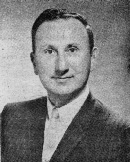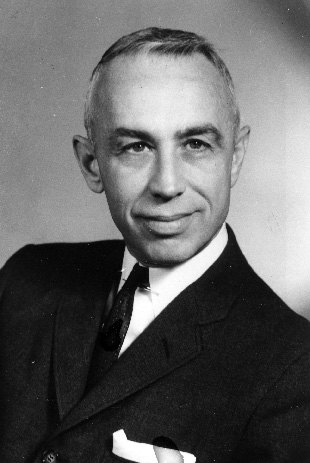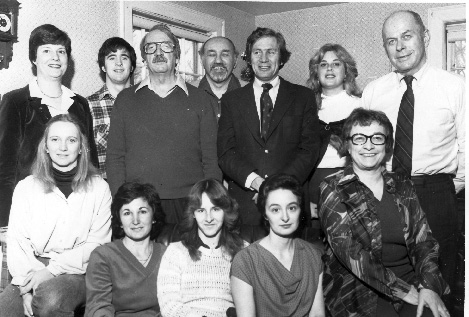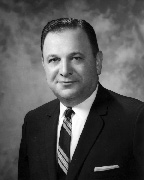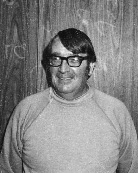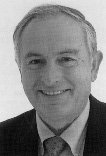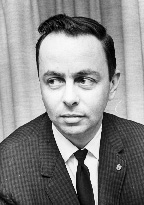Chapter One - January 13, 1963: The bell in the famous old Trinity
Church in Copley Sq. rang twelve times as a frigid group of novices pasted in the last headline for the inaugural 12-page issue of the New England Real Estate Journal dated January 17, 1963. It contained just $900 in advertising revenue which included a Carleton Hunneman (donation) quarter page; Boston Wharf Company (feature article) quarter page; Lester Feinberg bottom front page banner ($10.00 per week), a Bernard Berkman mortgage ad and a Fred Meyers one inch $2.00 ad (among others). The workers included the original three partners and their wives, none of them with any newspaper backgrounds, along with a friend, Winston Perry (Briggs Engineering). The partners: 1. George Cleveland, the financial backer and editor who put in $10,000. 2. Herb Siegel, whose father owned many of the old buildings located on Boylston St. directly across from the Back Bay rail yards - two years later becoming what is today the Prudential Center. 3 Roland Hopkins, a former disc jockey working in towns like Bristol, Conn., Milford, Mass. and Portland, Me. Cleveland, Hopkins and Perry were fraternity brothers from college days (DKE), and Siegel was the elder (30) who thought up the idea. Before tackling the unchartered waters of journalism, I decided to check on the feasibility of a commercial real estate newspaper.
So I did a brief survey. I approached Frank Perry (A.W. Perry Company) in an elevator and asked him about the idea. At the time he was running for governor of Massachusetts. He said, "There has only been one new building in Boston in the last 50 years, so I would say that not many people make their living in commercial real estate. Forget about it." I next visited the executive director of the Greater Boston Real Estate Board, Ray Hoffard. He was busy, never smiled and advised, "Forget about it, kid. Maybe a residential newspaper would work. Only one in a hundred real estate licenses are commercial. Don't waste your time." Finally, I approached a successful young lawyer, lecturer, and property manager, Martin Berman. His father had been the first landlord to remodel apartments. He chuckled. "Go back to your disc jockeying and do record hops like Woo Woo Ginsberg," he said. So with those three strikes against us, we went ahead anyway. Why? I'm not sure I remember, but none of us had jobs, it seemed like it would be fun, and the only thing we had to lose was Cleveland's money. And it was fun for three months when we woke up to the fact that $10,000 wasn't anywhere near enough to survive. Someone once said that knowledge is power and ignorance is bliss. We found out the hard way that we were three very blissful fools.
Chapter Two - Learn by Doing: In the late 1950s I attended The Cambridge School of Radio and TV Broadcasting. Their motto, printed on a front door entrance plaque, was LEARN BY DOING. Since I had learned very quickly that I didn't know beans about commercial real estate or publishing a newspaper, I woke up to what that plaque really meant. I didn't learn beans at that school, but I did learn a lot when I finally landed a job in the broadcast industry. Three out of the 33 graduates went on to make a living in radio. Now, several years later, I found myself groveling for enough income to make the next week's small newspaper payroll. The only way I was going to learn was to ask questions of those who knew, then shut up and listen to answers. I visited a big bank and asked for a loan. They asked for collateral. I had none. So I decided to visit another bank - this one seemingly a bit more liberal than the stuffy ones where the president resided on a top floor very non-accessible office. In the heart of downtown Boston sat City Bank & Trust. The front door was glass and the president sat in back with his door always open. I stood outside and could see him sitting there doing his business right in plain sight. I went in, waited my turn. And, very humbly, with shaking hands, I showed him my skinny 16-page paper along with my P & L statement. He spent several seconds perusing it, looked up at me and said, "I can't help you, sonny. Your business is a deficit corporation." Since my true mission was to ask questions, I bravely asked him three things. "What's a deficit corporation? How would you change the paper to make it better? And, I already knew how you can't help me, so I came in here to find out you can." He answered all three and ended up sending me to a company that financed receivables. For over a year I financed my receivables. If the paper had $2,000 of advertising revenue in it, the finance company would immediately hand me a check for $1,400. And it kept me in business. Of course, if I had kept doing that for too long, I would have gone broke. But it saved me for long enough to pick more brains and learn. The bank president's name was Ruby Epstein. Today I can't remember where I put my glasses, but I'll never forget Mr. Epstein.
Chapter Three - Coincidence: Some wise man once said, "If you wait for the right time to do something, the right time never comes." 90% of all commercial real estate development in New England has occurred in the past 45 years. My definition of commercial real estate is, "Anything other than houses." In January 1963 there existed one shopping mall - Shopper's World in Framingham. One industrial park, which was Cabot Cabot & Forbes' on Rte. 128 in Newton. And only one new office building had been constructed in Boston in the past 50 years - the 25-story John Hancock Building. And the cities and towns were just beginning to set aside some money to tear down the old and build new. They called it URBAN RENEWAL. Could the timing have been any better for a commercial real estate newspaper?
Chapter Four - The Strangest Secret: Here's what happened that made the Journal successful and became the largest weekly commercial real estate periodical in the country (world). 1. I met and hired Bob Lewis, an experienced newspaper space salesman who was broke. He turned out to be the greatest salesperson I had ever met or even read about. No matter how much I paid him he stayed broke. So he sold more and more and more. What makes Sammy run? 2. My two partners got discouraged and left me with a deficit corporation. Someone asked me why I stayed. I was already broke with a mortgage and four mouths to feed. Simple decision: If I quit the paper, I'd still be broke. 3. I went on the road with my 99,000 mile auto and knocked on doors all over New England - sometimes with appointments and sometimes unannounced. I drove to Presque Isle, Biddeford, Scarborough, Lewiston, Gardner, and Augusta. I drove to Nashua, Portsmouth and Francestown. I drove to Rutland. I drove to Providence, Woonsocket and Pawtucket. I drove to, Hartford, Manchester, Bristol, and Fairfield. I drove to Cape Cod, Hudson, Chicopee, Brockton, Plymouth, and Ludlow. And one day I drove to the middle of Massachusetts to a town that I had never heard of before that is only famous for a lake that has more letters in the name than any other. The town was Webster and the lake, Lake Chargoggagaggmanchaugagoggchaunagungamaugg. I had discovered that every small town had at least one entrepreneur that owned almost everything. When I visited Nashua, Sam Tamposi drove me around and showed me apartment houses, a nursing home, a strip center, an auto mall and the airport. "I own them," he said. Later on he bought a share in the Boston Red Sox. Well, in Webster the entrepreneur was Herman Becker. He walked into the waiting room and told me he was busy and would see me in awhile, but I could listen to a record while I was waiting. He handed me a 33 1/3 RPM record and put it on a small turntable. "Listen to this and I'll be right back," he said. I listened and became spellbound. It was Earl Nightingale's The Strangest Secret. Nightingale was probably the number one success motivator in the 20th Century. I'd never heard of him! Mr. Becker came back into the room and asked me what I thought of the record. I was mesmerized. Mr. Nightingale preached that in order to succeed you had to have goals (I always thought goals were something in a hockey game), write them down, look at them 24/7 and then you become what you think about. That was the strangest secret and it worked. At least it worked for a lot of people who shut up and listened and followed directions. Mr. Becker told me that the sales course cost $120. I had driven way out to Webster to sell him an ad and he had turned the tables on me. No wonder he owned the town. "I only have $2.," I honestly told him. "If you promise to listen to the record course and follow directions, I'll let you take it and pay me later," he said. I did and it changed my whole life - and the life of the Journal. Any questions? From then on I asked questions, shut up and listened to answers. I think they call it PICKING BRAINS. And, I managed to pick the best brains in the business. My best compliment came from a successful real estate developer who I spent the better part of an hour talking to in his back yard. People are comfortable on their own turf. At the end of the conversation he said, "You know, Rolly, we just spent an hour talking to each other and I don't know a single thing about you." And I said, "But I know all about you." Any questions?








